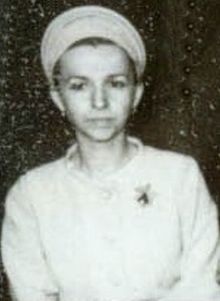Lyudmila Zhivkova
| Lyudmila Todorova Zhivkova | |
|---|---|

Zhivkova in 1978
|
|
| President of the Committee for Art and Culture | |
|
In office 1975–1981 |
|
| Personal details | |
| Born |
26 July 1942 Govedartsi, Bulgaria |
| Died | 21 July 1981 (aged 38) Sofia, Bulgaria |
| Political party | Bulgarian Communist Party |
| Spouse(s) | Lyubomir Stoychev (divorced) Ivan Slavkov |
| Alma mater |
Sofia University Moscow State University St Antony's College, Oxford |
| Profession | Art historian |
| Committees | Committee for Art and Culture |
Lyudmila Todorova Zhivkova (Bulgarian: Людмила Тодорова Живкова; 26 July 1942 – 21 July 1981) was the daughter of Bulgarian Communist leader Todor Zhivkov, who reached the rank of senior Bulgarian Communist Party functionary and Politburo member. Primarily known for her interest in preserving and promoting Bulgarian arts and culture on the international stage, Zhivkova was also a controversial figure within the former Soviet Bloc because of her interests in esoteric Eastern religion and spirituality.
Zhivkova was born in Sofia. She studied history at Sofia University (1965) and history of art at Moscow State University (1970), before researching a book on British-Turkish relations at St Antony's College, Oxford. She then became assistant president of the Committee for Art and Culture (1972–1973), its first vice president (1973–1975) and its president (with the rank of a minister) between 1975 and her death in 1981. Zhivkova was a deputy in the 7th (1976–1981) and 8th (1981) National Assembly of Bulgaria. In her lifetime, Zhivkova published a volume of "collected works" (mostly edited speeches) which was translated into major world languages; her trademark ideas about the need to bring up and educate “rounded personalities” and "imbue public life with beauty" sat awkwardly alongside militant Marxism–Leninism.
Lyudmila Zhivkova's office as the de facto head of Bulgarian culture brought the nation's artistic community increased freedom at a time when, after the crushing of the Prague Spring, Soviet-bloc Communist orthodoxy was otherwise stricter than ever. Moreover, as daughter of the head of Party and state, Zhivkova was often seen as "heir apparent" and enjoyed powers beyond her official purview. Thus, Zhivkova and her second husband Ivan Slavkov held renowned Friday soirées at their central Sofia apartment, offering opportunities for those with a cause to lobby her father indirectly.
...
Wikipedia
